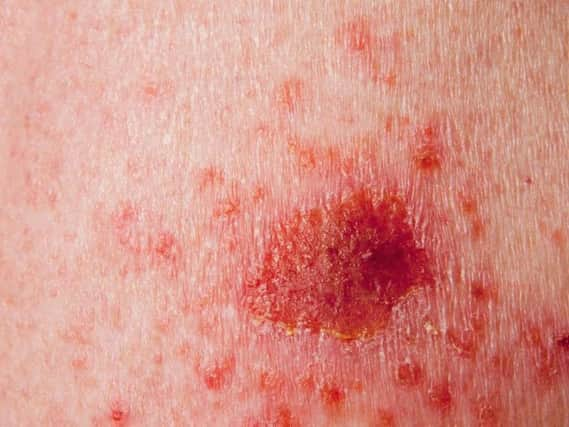Warning: How just one glass of beer a day could give you skin cancer


Any type of tipple raises the likelihood of developing two forms of the disease, a large scale study found.
Every daily 10 gram shot increased participants' risk of cutaneous squamous cell carcinoma by eleven percent, and basal cell carcinoma by seven percent.
Advertisement
Hide AdAdvertisement
Hide AdIt is believed chemicals released when alcohol is broken down by the body are to blame.
Dermatologist Dr Eunyoung Cho, of Brown University, Rhode Island, said: "Given the high prevalence of skin cancer and alcohol drinking, modifying alcohol behaviour may be a realistic intervention goal that can help substantially reduce the global non-melanoma skin cancer burden."
She added: "This is an important finding given there are few ways to prevent skin cancer."
Last year the same team found a daily glass of white wine increased the risk of melanoma, the third and deadliest type of the disease, by 13 percent.
Advertisement
Hide AdAdvertisement
Hide AdSkin cancer is the most common form of cancer in the UK, and rates are rising.
Around 3.6 percent of cancer cases across the world have been attributed to alcohol including those of the liver, pancreas, bowel and breast.
This is because ethanol in alcohol can metabolise into acetaldehyde, a compound that can damage DNA.
Dr Cho said: "In general, ethanol metabolism plays a major role in alcohol carcinogenesis.
Advertisement
Hide AdAdvertisement
Hide Ad"Ethanol is metabolised by alcohol dehydrogenase to acetaldehyde, a carcinogen which can inhibit the DNA repair system.
"Ethanol metabolism also results in the production of reactive oxygen species, which cause DNA damage and contribute to mutations."
In what is known as a meta-analysis Dr Cho and colleagues pooled data from thirteen previous studies, including one from the UK, that followed participants for up to 30 years, comparing alcohol consumption with 95,241 cases of non-melanoma skin cancer.
The study published in the British Journal of Dermatology defined a standard drink as 10g of alcohol, about a small glass of wine or half a pint of beer.
Advertisement
Hide AdAdvertisement
Hide AdCutaneous squamous cell carcinomas and basal cell carcinomas are tumours that arise in the outer layers of the skin, but in different cell types. Unlike melanomas, they are normally easily treatable.
Dr Cho said: "Non-melanoma skin cancer, which includes primarily basal cell carcinoma (BCC) and cutaneous squamous cell carcinoma (cSCC), accounts for the majority of skin cancers and is also the most common malignancy in the United States.
"Those born in 1994 have an estimated 28-33% lifetime risk for BCC and 7-11% for cSCC. Moreover, incidence rates of both BCC and cSCC are increasing worldwide."
Added Dr Cho: "In our meta analyses, higher alcohol intake was significantly associated with an increased risk for both BCC and cSCC in a dose dependent manner."
Advertisement
Hide AdAdvertisement
Hide AdAt least 100,000 new cases of skin cancer are now diagnosed in the UK each year, and the disease kills over 2,500 people - that is seven people every day.
The cost to the NHS of treating non-melanoma skin cancer is expected to rise to £465m a year by 2025 as a direct result of people getting tans on foreign holidays and in salons.